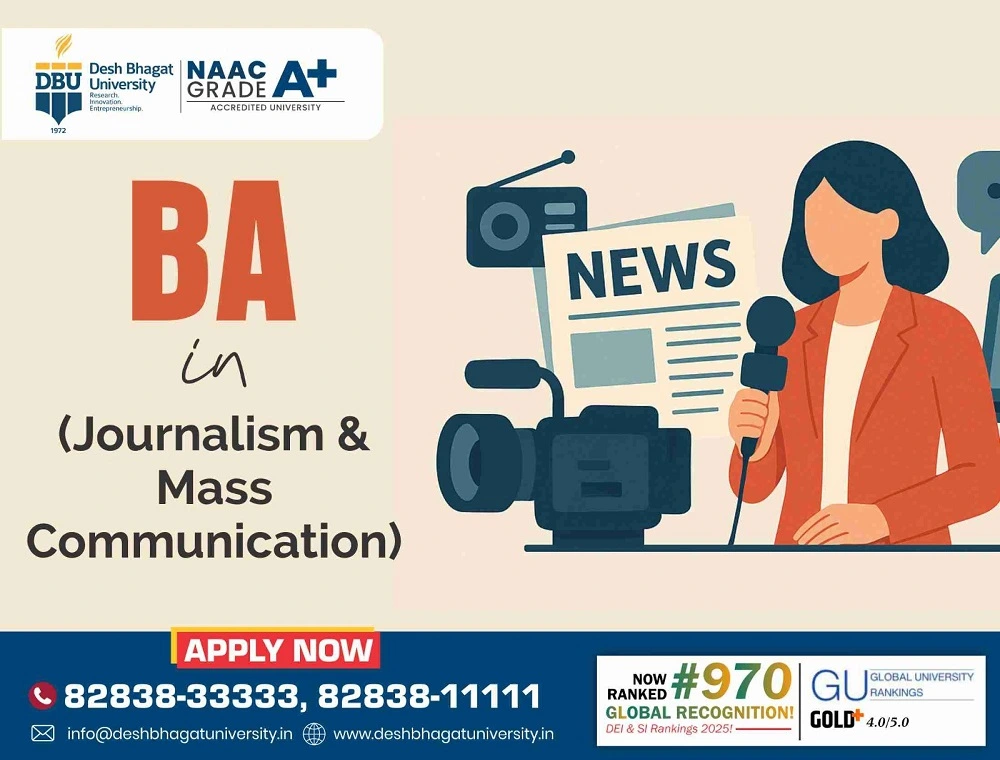BA Journalism & Mass Communication (BAJMC): Full Form, Scope
November 21, 2025 2025-11-21 10:36BA Journalism & Mass Communication (BAJMC): Full Form, Scope

BA Journalism & Mass Communication (BAJMC): Full Form, Scope
At Desh Bhagat University, we understand how exciting and important it is to choose the right undergraduate programme. One such programme that stands out in today’s media‑rich world is the B.A. (Journalism & Mass Communication) — sometimes referred to by many as BAJMC (though at our university, we list it as B.A. (Journalism & Mass Communication), the concept is the same). In this article, I’ll explain in very simple terms everything you need to know: the full form of BAJMC, what the course is about, what we teach at DBU, the eligibility, and why this might be the ideal path for you.
What does BAJMC mean?
“BAJMC” stands for Bachelor of Arts in Journalism & Mass Communication (i.e., BA + Journalism & Mass Communication). At DBU, we describe it as a B.A. in Journalism & Mass Communication, which is an undergraduate (three‑year) programme designed to help you understand media, communication, journalism, and mass media practically.
- The “B.A.” means Bachelor of Arts, which shows this is an arts/humanities‑based degree.
- “Journalism & Mass Communication” refers to the field: journalism (reporting, news, writing) and mass communication (media‑channels, digital media, broadcasting).
So when you see BAJMC full form, you can think of “Bachelor of Arts in Journalism & Mass Communication”.
Why choose B.A. (Journalism & Mass Communication) at DBU?
Choosing this programme at DBU means you will benefit from our university’s strengths: a modern campus, experienced faculty, focus on practical learning, and strong links to the media world. Some key reasons:
- The media and mass communication field is growing.
- At DBU, we focus on hands‑on learning: media labs, production work, and digital media. This means you will gain practical skills, not just theory.
BAJMC Course Details: What you will study
Here is a more detailed look at what the B.A. (Journalism & Mass Communication) course covers at DBU.
Duration
The programme is a three‑year degree, typically spread over six semesters (two semesters per year). We list it as a 3‑year course on our page.
What you will learn
The course blends theory and practice. Some of the topics and skills you’ll develop include:
- Foundations of journalism: how news is gathered, how writing works, how to present stories.
- Mass communication: how media (print, broadcast, digital) reach large audiences, how communication flows in society.
- Digital media skills: blogging, social media, video production, online content creation — important in today’s world of media.
- Media laws and ethics: understanding the legal and ethical side of journalism and media.
- Practical media‑production: labs, studios, editing suites, out‑of‑class projects, and internships (our earlier prospectus mentions “studio‐based creative workshops, documentary production, news presentation workshops,” etc).
- Public relations & advertising: since media is not just journalism, mass communication covers brand messaging, social media strategy, and communication for organisations.
- Media research and management: how media organisations work, audience research, and how to plan media campaigns.
Why this combination matters
Because media today is not just newspapers and TV—it’s digital, it’s social media, it’s content everywhere. By combining journalism and mass communication, we prepare you for news roles and many other roles (e.g., content creator, social‑media manager, PR executive).
BA Journalism & Mass Communication Eligibility at DBU
To apply for the B.A. (Journalism & Mass Communication) programme at DBU, you should check these eligibility criteria:
- You must have completed 10 + 2 (or equivalent) from a recognised board.
- Minimum marks: The BA admission page states a minimum of 50% aggregate marks in Class 12 is required.
- Stream: You can apply from any stream (Arts, Science, and Commerce), as many options show “any stream” in our eligibility description.
- Age: There is no specific age limit mentioned on our admission page.
- Application: You will need to fill out an online application, upload mark‑sheets, identity proofs, etc. (mentioned on the admission page).
How to Apply for B.A. (Journalism & Mass Communication) at DBU
Here’s a step‑by‑step guide on how you can apply to the BAJMC programme at DBU:
- Visit our official website’s admission page (for BA programmes).
- Create an account/register with your email and mobile number. (As per the admission page).
- Fill the online application form: personal details, educational background (10+2), choice of programme (choose B.A. (Journalism & Mass Communication)).
- Upload required documents: 10th mark‐sheet, 12th mark‐sheet, identity proof, passport‑size photograph, and signature. (Document upload mentioned).
- Pay the application fee (if applicable) and submit your form before the deadline.
- Wait for merit list/selection: Since the BA page states “no entrance exam required” for certain cases, many students are selected on the basis of 12th marks.
- Once selected, complete further formalities: document verification, pay first semester fees, join orientation, and begin your classes.
By following these steps, you can secure your place in this exciting programme at DBU.
What Happens After You Enrol – Learning Experience at DBU
Once you join the B.A. (Journalism & Mass Communication) at DBU, here’s what you can expect from your learning experience:
- Interactive classrooms: We don’t just lecture you; we encourage questions, discussion, media labs, group work, and hands‑on training.
- Media production labs: You will get access to media facilities, studios, editing rooms, and digital tools to practise journalism, audio/video production, and content creation.
- Projects and internships: You will work on projects, assignments, and likely engage in internships that give you real‑world exposure to journalism, media houses, or digital media firms. This builds your portfolio.
- Guest lectures & workshops: Industry professionals, media experts, and guest speakers will visit to share insights, the newest trends in media, social media communication, and digital content.
- Skill development: We focus on key skills—writing clearly, speaking on camera, editing video/audio, managing media platforms, understanding audience, applying media ethics, teamwork working and leadership in media contexts.
- Career support: At DBU, we help you prepare for careers in media, communication, public relations, digital content, journalism, etc.
This is not just a course of theory—it is about building your practical capabilities so you can enter the workforce or media world confidently.
The Scope of the Programme: Career and Growth
When you complete your B.A. (Journalism & Mass Communication) (or BAJMC) at DBU, many paths open up for you. The world of media and communication is broad and evolving. Here are some career possibilities:
- Journalist / Reporter: You could work for newspapers, magazines, online news portals, or broadcast media.
- Digital content creator / Social media manager: Because media is shifting online, your skills in digital media will be in high demand.
- Public Relations & Brand Communication: Big brands, organisations, and agencies need communication specialists who know mass media, social media, and messaging.
- Broadcast / TV / Radio Presenter or Producer: If you like being on camera or behind the scenes, this field is open.
- Media Planner / Advertising Executive: You could craft campaigns, manage media strategy, and plan content across platforms.
- Content Writer / Editor: Write blogs, articles, web content, newsletters, and media articles.
- Research & Media Analytics: Understand audience behaviour, measure media impact, plan strategies.
The combination of journalism + mass communication gives you flexibility: you are not limited to just traditional journalism—you can work in digital media, public relations, brand communications, etc. That means your future can change with the media landscape, and you will be ready for it.
Summary – Everything in One View
Here is a quick wrap‑up of the key things about the programme at DBU:
- The programme: B.A. (Journalism & Mass Communication), also thought of as BAJMC full form = Bachelor of Arts in Journalism & Mass Communication.
- Duration: 3 years (six semesters) at DBU.
- Eligibility: 10+2 from any recognised board; minimum ~50% marks; stream can be any (Arts/Commerce/Science).
- How to apply: Online form → upload documents → pay fee → selection based on 12th marks (or merit) → join programme.
- What you will study: Journalism, mass communication, digital media, media laws & ethics, production skills, PR, advertising, and research.
- What you will get: Practical skills, industry‑relevant experience, career‑ready portfolio, opportunities across media/digital/PR.
- Why DBU: Modern media infrastructure, media and communication focus, strong career support, flexible for 12th science/commerce students too.
- Career scope: Wide—from journalism to content creation, from PR to digital media, from broadcast to research.

At Desh Bhagat University, we believe that a programme like B.A. (Journalism & Mass Communication) is more than a degree—it is the key to your future in a world where media and communication matter more than ever. If you are someone who loves storytelling, exploring ideas, creating content, analysing media, or connecting with people through communication, then this programme is for you.
We invite you to take this step: explore our website, check the latest admission dates for the B.A. (Journalism & Mass Communication) programme, review the detailed syllabus and fee structure, and apply to become part of the DBU family. Your journey into the exciting world of journalism, media, and mass communication starts here—with us.
We look forward to welcoming you, guiding you, and helping you become a skilled media professional, ready for the demands of today’s media world. Welcome to Desh Bhagat University and the world of B.A. (Journalism & Mass Communication).
FAQs
1. What is the full form of BAJMC?
BAJMC stands for Bachelor of Arts in Journalism & Mass Communication. It is an undergraduate degree that focuses on teaching students how to work in the media industry, including journalism, digital media, advertising, public relations, and broadcasting. This course combines theory with practical skills in media production and communication.
2. What will I learn in the BAJMC program at Desh Bhagat University?
In the B.A. Journalism & Mass Communication (BAJMC) program at Desh Bhagat University, you will learn about journalism, mass communication, media ethics, public relations, advertising, digital media, and more. You will also get practical experience through media labs, studio work, internships, and projects, which will help you develop key skills needed in the media industry.
3. What is the duration of the BAJMC course at Desh Bhagat University?
The B.A. Journalism & Mass Communication course at Desh Bhagat University is a three-year undergraduate program. It is divided into six semesters (two semesters per year). Over the course of three years, you will study various aspects of media, journalism, communication, and production, preparing you for the professional world.
4. What are the eligibility requirements for the BAJMC program at DBU?
To apply for the B.A. Journalism & Mass Communication course at Desh Bhagat University, you need to have completed 10+2 (or equivalent) from a recognized board. There is no specific stream required, so students from Arts, Science, and Commerce can apply. You also need to have a minimum of 50% marks in your 12th-grade exams.
5. How do I apply for the BAJMC program at Desh Bhagat University?
To apply for the B.A. Journalism & Mass Communication program at Desh Bhagat University. Visit our website and fill out the online application form. You will need to submit your 10th and 12th-grade mark sheets, identity proof, and other documents. Admission is usually based on merit, and there may be an interview or an entrance exam for some students.
6. What career opportunities are available after completing BAJMC?
After completing the B.A. Journalism & Mass Communication (BAJMC) program at DBU, you will have a wide range of career opportunities. These include becoming a journalist, reporter, content writer, public relations officer, advertising executive, digital media specialist, social media manager, or working in radio and television. The media industry is growing rapidly, providing many exciting job prospects.
7. What subjects will I study in the BAJMC course?
The B.A. Journalism & Mass Communication program at Desh Bhagat University covers a wide range of subjects, including journalism, mass communication, media laws, advertising, public relations, digital media, and media production. You will also have practical learning opportunities in areas such as video editing, radio, and television production. The course is designed to give you both theoretical knowledge and hands-on experience.
8. What makes the BAJMC program at DBU unique?
The B.A. Journalism & Mass Communication program at Desh Bhagat University is unique because of its strong focus on practical learning. We provide state-of-the-art media labs, production studios, and internship opportunities to ensure students gain real-world experience. Additionally, our faculty has extensive industry experience, ensuring you receive relevant and up-to-date knowledge in the media field.
9. Is there an entrance exam for the BAJMC program at DBU?
The B.A. Journalism & Mass Communication program at Desh Bhagat University generally does not require an entrance exam. Admission is based on the merit of your 12th-grade marks. However, in some cases, there might be an interview or selection process depending on the number of applicants. Please check the official website for any updates on the admission process.
10. What are the fees for the BAJMC course at Desh Bhagat University?
The fees for the B.A. Journalism & Mass Communication course at Desh Bhagat University generally ranges from ₹50,000 to ₹1,00,000 per year. Additional fees may apply for media labs, studios, examinations, and other facilities. For the most accurate and updated fee structure, you can visit our official website or contact the admissions office.






